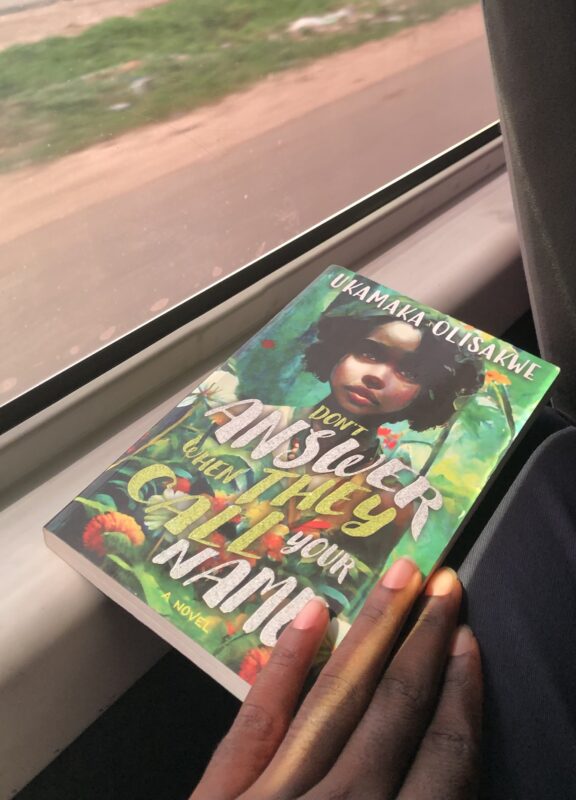Book Reviews
Who Is Championing Our Own Stories? | A Review of Don’t Answer When They Call Your Name
In a world where we incessantly consume folktales from the Western world—tales of vampires, witches, werewolves, and shapeshifters—who is championing our own stories? Who is preserving the tales of the Orimili River, the Evil Forest, the Ani Nke Ozo, and the Ani Nchefu?
I believe that “Don’t Answer When They Call Your Name” by Ukamaka Olisakwe embodies something powerful. As someone who grew up enthralled by the folktales shared by my grandmother and immersed in Nollywood, with Dinta and Chioma Chukwuka capturing my attention, this book touched the depths of my inner child, bringing about a profound sense of healing.
I generally gravitate towards serious writing or books written for a more mature audience because I am desperately searching for pain written in shiny letters. Yet, upon reading this book, I found myself enveloped in a bountiful embrace of grace and joy. It possessed a rapid pace, brimming with action and stirring emotions that I couldn’t get enough of.
I think my favorite thing about this book is how you can easily tell it was written for a younger audience but still find yourself captivated by the language. By the simplicity of it and how simple words can hold meaning for very complex things.
The book opens up with the tale of Big Father’s union with Big Mother. Big Mother, accustomed to pursuing her passions, is compelled to relinquish them due to their perceived lack of “womanliness.”
The prologue is a lush tapestry that resounded in my mind, reminiscent of my grandmother’s storytelling days about the ancient deities of our village’s river.
The story follows Adanne’s journey into the Forest of Iniquity to rescue her people. This is me trying not to give away so much because I believe you should go into this story blind.
This book is important because it extends a firm hand to the younger generation. Since time immemorial, Igbo culture has relied heavily on storytelling—narratives passed down from the eldest parents to the youngest children. Stories shared under moonlit skies, beneath the shade of Udala trees, within the bustling market square, or in town halls. Unfortunately, this rich tradition is vanishing at an alarming pace. The space where children are allowed to imagine with their bright eyes and unblemished minds is rapidly disappearing. And that space is precisely what I believe this book firmly holds.
In a world where we incessantly consume folktales from the Western world—tales of vampires, witches, werewolves, and shapeshifters—who is championing our own stories? Who is preserving the tales of the Orimili River, the Evil Forest, the Ani Nke Ozo, and the Ani Nchefu?
Who is reminding children that we possess powerful stories within our own culture? Stories infused with life-saving lessons and jaw-dropping twists? Stories potent enough to nourish their imaginations without relying on TVs and DSTVs.
I thoroughly enjoyed the pacing of this story. It was sharp, edgy, and astonishingly, Ukamaka managed to develop her characters amidst brevity. That’s what I find truly remarkable—saying so much in very little words, and in very limited time, with a tender language.
Upon reaching the end, I experienced a peculiar hunger, rooted in loss and maybe nostalgia? I felt a kinship with Adanne and the possibilities that await her in the world. Yet, I also felt hope and joy, having experienced such a beautiful story.
My hope is that we encounter more books like “Don’t Answer When They Call Your Name.” I am aware that we are just beginning, and the Nigerian literary landscape is expanding, but we crave more. More books like this, more readers purchasing and sharing books like this, more publishers and writers crafting books of this caliber. More and more. And I am confident that we will get there.
About the Writer: Nnaemeka Nnam is a Nigerian writer and bookstagrammer. Nnaemeka wants you to embrace love, sadness and joy as they come. When he’s not obsessing over books on Instagram, they are wishing upon a star.



Pingback: I Was Back to Being the Playful Child Who Thought She Could Do Anything-In Conversation with Ukamaka Olisakwe | Rovingheights Books